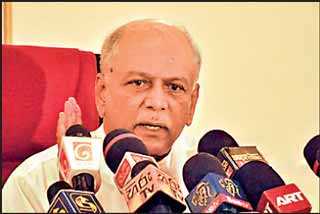Friday Feb 20, 2026
Friday Feb 20, 2026
Wednesday, 24 March 2021 00:30 - - {{hitsCtrl.values.hits}}
By Uditha Jayasinghe
 |
| Minister of Foreign Affairs Dinesh Gunawardena |
Foreign Minister Dinesh Gunawardena was yesterday upbeat about the number of votes received by Sri Lanka at the United Nations Human Rights Council (UNHRC) and insisted the Government would not deviate from a domestic mechanism despite adoption of the resolution.
Even though Sri Lanka received less votes than it had on past occasions, Gunawardena nonetheless insisted on describing it as the global south coalescing against its northern counterparts.
He also slammed co-sponsors of the resolution and those who voted for it as having no moral right to do so given that some of these same countries had blocked poorer countries from getting access to COVID-19 vaccines.
The Minister also emphasised that Sri Lanka had restored human rights when it ended the war and the latest resolution was purely politically motivated.
He argued that most Asian, Africa, South and Latin American countries were supportive of Sri Lanka and thanked both President Gotabaya Rajapaksa and Prime Minister Mahinda Rajapaksa for helping drum up backing through personal engagement including phone calls ahead of the vote. He also thanked the countries that both abstained and voted against the resolution.
“Today’s call, if you listen and watch the voices of other countries, is to first deal with COVID-19 and give vaccinations to over 100 countries that are today asking for vaccinations. It is not a time to be bring country-specific resolutions. This was the voice. Sri Lanka was appreciated by all these countries which expressed their viewpoints.”
“Of the 47 countries of the Human Rights Commission, they could only harness 22, as many as 25 voters did not say yes to the resolution. This is an important point. These countries were under great pressure and we thank them for standing up not only for the defence of Sri Lanka but all other countries.”
The Foreign Minister argued that it was impossible for Sri Lanka to co-sponsor the resolution, as done by the former Government, as it was based on unsubstantiated and biased reports that were completely rejected by the Government.
“When the President decided to withdraw from the co-sponsorship of the resolution, it was because it’s not constitutionally possible. This was said by my predecessor as well. But the President has appointed domestic mechanisms, headed by a Supreme Court Judge, to entertain any complaints made by any Sri Lankan regarding events that took place during the war. The Government will continue to work with UN agencies and engage with the international community as we have always done. But we will not permit any interference in our sovereignty,” he added.
Gunawardena declined to comment on what action would be now taken by the Government after the adoption of the resolution but reiterated they were against efforts to collect evidence that could be used in future human rights cases.
“They want a process to collect various information on Sri Lanka. This is what this resolution initiates but this could lead to more dangerous objectives if they are able to succeed.”
